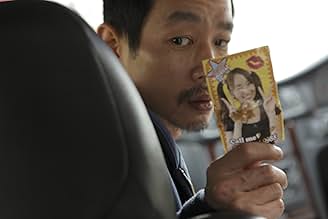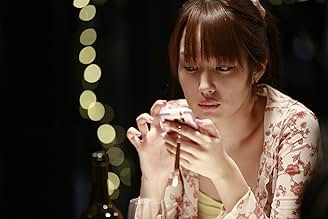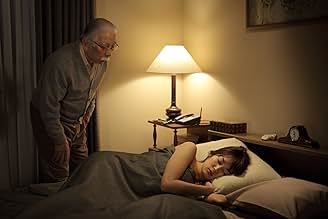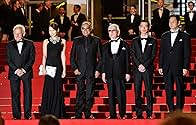CALIFICACIÓN DE IMDb
7.0/10
14 k
TU CALIFICACIÓN
En Tokio, una joven trabajadora sexual desarrolla una conexión inesperada con un viudo durante un período de dos días.En Tokio, una joven trabajadora sexual desarrolla una conexión inesperada con un viudo durante un período de dos días.En Tokio, una joven trabajadora sexual desarrolla una conexión inesperada con un viudo durante un período de dos días.
- Dirección
- Guionistas
- Elenco
- Premios
- 1 premio ganado y 6 nominaciones en total
Kôichi Ôhori
- Taxi Driver
- (as Kouichi Ohori)
Ryota Nakanishi
- Student
- (sin créditos)
- Dirección
- Guionistas
- Todo el elenco y el equipo
- Producción, taquilla y más en IMDbPro
Opiniones destacadas
Like Someone in Love (2012) is a Japanese movie written and directed by the great Iranian filmmaker Abbas Kiarostami. Kiarostami brings his quiet, thoughtful style to a culture that is surely very alien to him. Japanese viewers may note cultural errors in the movie. My thought is that Kiarostami can look beyond cultural differences to universal themes.
The movie, set in Tokyo, stars Rin Takanashi as Akiko, a young provincial woman who is a call girl. (She doesn't walk the streets. She works out of a bar, whose owner arranges the sessions at people's homes.) As the movie opens Akiko is facing two immediate problems. Her jealous boyfriend is on the phone, demanding to know where she is. Akiko is a college student, and her boyfriend is aware of that. He doesn't know that she's a prostitute, but he can sense that something isn't right, and he suspects her of cheating.
Akiko's grandmother is visiting Tokyo that day, and desperately wants to see Akiko. Akiko would love to meet with her, but the bar owner is adamant--she must go out on a call to an important client. The client is Professor Takashi Watanabe, played by Tadasi Okuno. Akiko has no choice but to ignore her grandmother and visit the professor's apartment.
Prof. Watanabe is a gentle, lonely widower. He has prepared a special dinner for Akiko, and he's playing Western music. (It's Ella Fitzgerald singing "Like Someone in Love.") It's more like a seduction scene than a paid sexual encounter.
Akiko spends the night at the professor's home, and he drives her to the university the next morning. It's at that point that the film takes a different turn, because Akiko's violent boyfriend confronts her on the university steps.
All of this action takes place in the first third of the movie. In the remainder of the film, Kiarostami continues to explore this unusual and somewhat threatening love triangle. This interaction among three very different individuals provides a fascinating look into human relationships. Where these relationships will lead isn't always obvious or predictable.
I enjoyed this intelligent, thought-provoking movie. It will work well on DVD. It's worth seeking out and watching.
The movie, set in Tokyo, stars Rin Takanashi as Akiko, a young provincial woman who is a call girl. (She doesn't walk the streets. She works out of a bar, whose owner arranges the sessions at people's homes.) As the movie opens Akiko is facing two immediate problems. Her jealous boyfriend is on the phone, demanding to know where she is. Akiko is a college student, and her boyfriend is aware of that. He doesn't know that she's a prostitute, but he can sense that something isn't right, and he suspects her of cheating.
Akiko's grandmother is visiting Tokyo that day, and desperately wants to see Akiko. Akiko would love to meet with her, but the bar owner is adamant--she must go out on a call to an important client. The client is Professor Takashi Watanabe, played by Tadasi Okuno. Akiko has no choice but to ignore her grandmother and visit the professor's apartment.
Prof. Watanabe is a gentle, lonely widower. He has prepared a special dinner for Akiko, and he's playing Western music. (It's Ella Fitzgerald singing "Like Someone in Love.") It's more like a seduction scene than a paid sexual encounter.
Akiko spends the night at the professor's home, and he drives her to the university the next morning. It's at that point that the film takes a different turn, because Akiko's violent boyfriend confronts her on the university steps.
All of this action takes place in the first third of the movie. In the remainder of the film, Kiarostami continues to explore this unusual and somewhat threatening love triangle. This interaction among three very different individuals provides a fascinating look into human relationships. Where these relationships will lead isn't always obvious or predictable.
I enjoyed this intelligent, thought-provoking movie. It will work well on DVD. It's worth seeking out and watching.
A vignette of some pretty sad people whose lives intersect in awkward ways over the course of a day. There's an escort/prostitute (Rin Takanashi), who isn't able to see the grandmother who's made a special trip to Tokyo to meet her, because she's going off to meet a client old enough to be her grandfather (Tadashi Okuno). He's a widower who used to teach, and struggles to get her to do the things he planned - drink some wine, eat the food he prepared, and talk - as instead she just wants to go to sleep. Then there's her troubled boyfriend (Ryo Kase), a guy who's in love with her but senses her distance and suspects she's up to something, heightening his jealousy and clinginess. He actually meets the older man the following day and assumes he's her grandfather, resulting in a strained conversation where he gets some advice. Even the nosy neighbor (Mihiko Suzuki) tells of how her love was unrequited and she's now cooped up, caring for her disabled brother.
They're all a bit broken, each in their own way, and yet Kiarostami allows each to engage in thoughtful dialogue that shows their humanity, and that they're not simply objects of pity. It's in those moments that I liked the film the most. I have to say, though, that its quiet style lagged a bit as it played out, and the ending was rather abrupt and unresolved. The quality of the filmmaking was high, and I could really feel myself on the streets of Tokyo at night and in the heads of these people, but the story wasn't particularly compelling to me, so I was left feeling it was a near miss.
They're all a bit broken, each in their own way, and yet Kiarostami allows each to engage in thoughtful dialogue that shows their humanity, and that they're not simply objects of pity. It's in those moments that I liked the film the most. I have to say, though, that its quiet style lagged a bit as it played out, and the ending was rather abrupt and unresolved. The quality of the filmmaking was high, and I could really feel myself on the streets of Tokyo at night and in the heads of these people, but the story wasn't particularly compelling to me, so I was left feeling it was a near miss.
"Like Someone in Love" is Abbas Kiarostami's follow-up to the mind- bending relationship drama "Certified Copy". Dissection of the title alone provides so many interesting clues and directions for the film to take in addition to what was analyzed previously. And while it does in fact address those interesting ideas (indirectly), it is as minimal as any film-going audience could possibly stand. We essentially watch an unexplained relationship unfold in almost real-time (just under 24 hours).
Akiko (Rin Takashi) is a college-aged girl up to something in the big city of Tokyo that is probably not good for her. She's having an argument with her boyfriend on the phone and she's saying no to a job that a middle-aged man is offering her. This middle-aged man is clearly her pimp and "no" means "yes, sir, I will do whatever you tell me to." So into the cab Akiko goes and we begin to worry about her safety. We spent an awful long time worrying about her safety with no idea what lies ahead for her. The cab ride was two hours long and we saw a lot of it. Akiko arrives at the apartment of an older gentleman looking for companionship. We don't really know what exactly Takashi Watanabe (Tadashi Okuno) wanted with Akiko, and then in the morning he drives her back to Tokyo. Another long car ride.
Visually the car rides were impeccably shot. The scenery was reflected in the windshield and we could still see the characters' faces behind. Unfortunately we don't really know what's happening with these characters during these long car rides. Sometimes a car ride is just a car ride.
Eventually we meet Noriaki (Ryo Kase), Akiko's offensive boyfriend. And he starts putting the relationships into perspective. A different perspective. He allows Akiko and Watanabe to act differently than they actually are, which allows us to start seeing them as they actually are. And then it ends. Well, not quite that quickly, but without giving anything away, it ends.
We're given so little on screen to examine that it can be frustrating even to the viewers that appreciate the subtle beauty in film. Two weeks after first seeing it, my mind has started to form a few opinions on what was being said but it's still a bit too little, too late.
Akiko (Rin Takashi) is a college-aged girl up to something in the big city of Tokyo that is probably not good for her. She's having an argument with her boyfriend on the phone and she's saying no to a job that a middle-aged man is offering her. This middle-aged man is clearly her pimp and "no" means "yes, sir, I will do whatever you tell me to." So into the cab Akiko goes and we begin to worry about her safety. We spent an awful long time worrying about her safety with no idea what lies ahead for her. The cab ride was two hours long and we saw a lot of it. Akiko arrives at the apartment of an older gentleman looking for companionship. We don't really know what exactly Takashi Watanabe (Tadashi Okuno) wanted with Akiko, and then in the morning he drives her back to Tokyo. Another long car ride.
Visually the car rides were impeccably shot. The scenery was reflected in the windshield and we could still see the characters' faces behind. Unfortunately we don't really know what's happening with these characters during these long car rides. Sometimes a car ride is just a car ride.
Eventually we meet Noriaki (Ryo Kase), Akiko's offensive boyfriend. And he starts putting the relationships into perspective. A different perspective. He allows Akiko and Watanabe to act differently than they actually are, which allows us to start seeing them as they actually are. And then it ends. Well, not quite that quickly, but without giving anything away, it ends.
We're given so little on screen to examine that it can be frustrating even to the viewers that appreciate the subtle beauty in film. Two weeks after first seeing it, my mind has started to form a few opinions on what was being said but it's still a bit too little, too late.
This could have been a great film since all the necessary elements are already there. The viewers can feel that they are in expert hands but unfortunately, director Abbas Kiarostami's need to make the viewer appreciate his genius does not work in the film's favor. Take the first scene for instance. I was very annoyed that the camera work made me feel a dissonance between what I saw & what I heard. Perhaps in his clever way, the director was trying to hint that nothing is as it seems. I don't know what his intentions were but I didn't care for his tricks.
Anyway, moving on with the story, we surmise that the young & beautiful Akiko has a possessive & jealous boyfriend & is being forced by her boss/pimp into an difficult position that she's unable to get out of. The scene with her cab circling around her waiting grandma under the statue is so beautifully done that instantly my ambiguity towards Akiko vanished & I wanted this unhappy young woman to somehow find a way out of her predicament. The client is an old & retired academic who wanted to spend some time with Akiko. It is hinted that she bears a resemblance to his own granddaughter. She's however too exhausted to eat or talk, & goes straight to sleep. The old man lets her rest & in the morning drives her to the College so that she can appear for her exam. There he meets her fiance, Noriaki, who tries to come across as a decent young man. He mistakes the old man for Akiko's grandpa. Noriaki feels that he's in love with her but the wise old man can sense that all's not well between the young lovers & says that they are both too young to marry. Noriaki is nice enough to the old man but the latter can see that Noriaki is uncouth, has no interest in education & is chauvinistic to the point that he feels that once he marries Akiko, she would have to give in to all his demands. He has a low self esteem, is irrational, desperate, delusional, & obviously not the brightest bulb in the bunch. His fiancee has been avoiding him & he has his suspicions regarding Akiko's work but is unwilling to see the facts. However, when he is faced with the truth, he reacts in a very volatile manner. The viewer along with Akiko & 'grandpa' feel frustrated that more than anything else, her unfortunate liaison with this seemingly harmless but actually deranged & aggressive man may doom her life forever.
Anyway, moving on with the story, we surmise that the young & beautiful Akiko has a possessive & jealous boyfriend & is being forced by her boss/pimp into an difficult position that she's unable to get out of. The scene with her cab circling around her waiting grandma under the statue is so beautifully done that instantly my ambiguity towards Akiko vanished & I wanted this unhappy young woman to somehow find a way out of her predicament. The client is an old & retired academic who wanted to spend some time with Akiko. It is hinted that she bears a resemblance to his own granddaughter. She's however too exhausted to eat or talk, & goes straight to sleep. The old man lets her rest & in the morning drives her to the College so that she can appear for her exam. There he meets her fiance, Noriaki, who tries to come across as a decent young man. He mistakes the old man for Akiko's grandpa. Noriaki feels that he's in love with her but the wise old man can sense that all's not well between the young lovers & says that they are both too young to marry. Noriaki is nice enough to the old man but the latter can see that Noriaki is uncouth, has no interest in education & is chauvinistic to the point that he feels that once he marries Akiko, she would have to give in to all his demands. He has a low self esteem, is irrational, desperate, delusional, & obviously not the brightest bulb in the bunch. His fiancee has been avoiding him & he has his suspicions regarding Akiko's work but is unwilling to see the facts. However, when he is faced with the truth, he reacts in a very volatile manner. The viewer along with Akiko & 'grandpa' feel frustrated that more than anything else, her unfortunate liaison with this seemingly harmless but actually deranged & aggressive man may doom her life forever.
The great Iranian director Abbas Kiarostami made "Like Someone In Love" in Japan but it could have been set anywhere for this is a film that knows no boundaries or borders. As you would expect from Kiarostami it's brilliantly written and directed and beautifully played, particularly by Tadashi Okuno as an old professor whose loneliness draws him to a young student supplementing her income by working as an escort. He's not looking for sex, just conversation and company and when, the next day, they run into her jealous boyfriend the old man allows himself to be mistaken for her grandfather ... and then the boy finds out the truth.
It's a film of mostly small dramas and when violence finally erupts Kiarostami keeps it off screen. For the most part these people simply talk, about their problems, their relationships and life itself and Kiarostami films sequences in 'real time' and with a fixed camera just as he does in his Iranian films. I found it mesmerizing, at times funny, sometimes moving and in the end, really rather shocking. It makes for essential viewing.
It's a film of mostly small dramas and when violence finally erupts Kiarostami keeps it off screen. For the most part these people simply talk, about their problems, their relationships and life itself and Kiarostami films sequences in 'real time' and with a fixed camera just as he does in his Iranian films. I found it mesmerizing, at times funny, sometimes moving and in the end, really rather shocking. It makes for essential viewing.
¿Sabías que…?
- TriviaIn the late 1990s Abbas Kiarostami was driving late at night while on a visit to Tokyo and witnessed a young girl on the side of the street dressed as a bride. In the years following, while visiting Tokyo to promote other films, he realized that he was always looking for that same girl because she had left such an impression but that he would never likely notice her again in real life because she wouldn't be wearing the same dress. This experience became the basis for the film.
- ConexionesFeatured in At the Movies: Cannes Film Festival 2012 (2012)
Selecciones populares
Inicia sesión para calificar y agrega a la lista de videos para obtener recomendaciones personalizadas
- How long is Like Someone in Love?Con tecnología de Alexa
Detalles
- Fecha de lanzamiento
- Países de origen
- Sitios oficiales
- Idioma
- También se conoce como
- The End
- Locaciones de filmación
- Shizuoka, Japón(Shizuoka Station)
- Productoras
- Ver más créditos de la compañía en IMDbPro
Taquilla
- Total en EE. UU. y Canadá
- USD 239,056
- Fin de semana de estreno en EE. UU. y Canadá
- USD 21,813
- 17 feb 2013
- Total a nivel mundial
- USD 562,878
- Tiempo de ejecución1 hora 49 minutos
- Color
- Mezcla de sonido
- Relación de aspecto
- 1.66 : 1
Contribuir a esta página
Sugiere una edición o agrega el contenido que falta

Principales brechas de datos
What is the Italian language plot outline for Like Someone in Love (2012)?
Responda



























